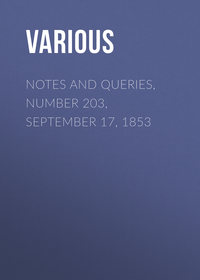Kitabı oku: «Notes and Queries, Number 203, September 17, 1853», sayfa 4
Various
Bir şeyler ters gitti, lütfen daha sonra tekrar deneyin
Türler ve etiketler
Yaş sınırı:
0+Litres'teki yayın tarihi:
01 temmuz 2019Hacim:
81 s. 3 illüstrasyonTelif hakkı:
Public Domain